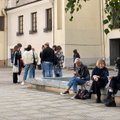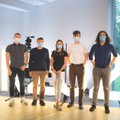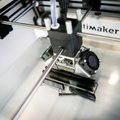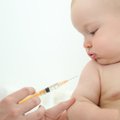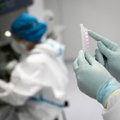With the world getting more advanced every day, artificial intelligence (AI) based software is finding its way into various areas of human activities. Institutions of higher education and their students are no exception. Discussions have been heating up about students shamelessly using ChatGPT to wr...
Kaunas University of Technology
125 straipsnių
“Lithuania has far exceeded my expectations,” says Deivid Mico from Albania, studying aviation engineering at Kaunas University of Technology (KTU). Expecting an average post-soviet republic, he arrived in a European country with perfect infrastructure and a contemporary educational system.
FinTech means technology-enabled financial innovation. European Commission emphasizes that there is a strong need to improve the competitiveness of European FinTech companies, creating a common regulatory approach across all countries. This could foster innovative solutions in banks and FinTech comp...
An interactive educational game “Flight across the Atlantic” featuring the legendary flight of Lithuanian pilots Steponas Darius and Stasys Girėnas was announced as one of the winners in the global digital innovation competition World Summit Awards (WSA). The product was created by the team of innov...
There are many myths concerning artificial intelligence (AI) today: people say that robots will replace human at work, or that the algorithms collecting big data will use it against people. Some of these concerns are grounded in reality: numbers just a few years ago had shown that robots would take ...
The COVID-19 pandemic has affected the education system worldwide. Many learning and teaching processes today take place online. Although such processes are not new, according to Vladas Lašas, Chairman of the Board of the Lithuanian Business Angels Network (LitBAN.LT), the changes were there, but th...
In the middle of November, Lithuania has signed an agreement with the United States to buy four Sikorsky UH-60M Black Hawk helicopters that will replace the Soviet Mi-8T still used by Lithuanian Armed Forces today. Soviet helicopter operational history exceeds 30 years, they are difficult to operate...
A team of researchers from Kaunas University of Technology and Lithuanian University of Health Sciences proposed a non-invasive method for detection of melanoma. A patented computer-aided diagnostic system developed by Lithuanian scientists proved to be more than 90% accurate in detecting malignancy...
Lithuanian respondents consume more sustainably in the home environment in comparison to the respondents in the UK – such conclusion was made by a group of researchers from Kaunas University of Technology School of Economics and Business (KTU SEB), Lithuania. After analysing the sustainable consumpt...
Gintarė Venzlauskaitė, a researcher at KTU Faculty of Social Sciences, Arts and Humanities, who has recently obtained her PhD at the University of Glasgow, Scotland, today is already a thousand miles away. Dr Venzlauskaitė is undertaking a four-month fellowship at one of the best in the world, Yale ...
In today’s context we can see that the challenges we are facing are affecting not only us, or other countries in Europe but all the world. This means that we can only solve them by taking decisions together. Problems are becoming more global, challenges are borderless: states are joining into unions...
KTU researchers together with colleagues from Latvia, Denmark, Sweden, Slovakia, Ukraine, Czechia, Belarus and the US are developing multifunctional composite materials for aircraft, cars, wind power plants and other structure production. The international team of researchers aims at making the new ...
Students that choose technological sciences are welcome in many companies, including space technology and space research centres in Lithuania and abroad. In contemporary world, even startups are capable to fulfil great ideas. However, every new project needs someone to believe and to invest in it. D...
Lithuanian researchers from Kaunas University of Technology and Vilnius University synthesised and tested a bio-based resin for optical 3D printing. The bio-based resin made from renewable raw materials proved to be universal for both table-top 3D printers and state-of-the-art ultrafast laser, suita...
There are more connections between art and technologies than might appear from the first sight. The most obvious one – art needs tools and equipment and technological innovation cannot happen without involving creativity and improvisation, thinks Nerijus Čepulis, philosopher, Associate Professor at ...
“Creativity is what happens when all the rules that restrict your movement are dismissed, if only in one’s mind”, says Thomas Andrew Bryer, Professor at Kaunas University of Technology (KTU), Director of the Office of Downtown Community-Engaged Scholarship and Professor in the School of Public Admin...
The #blacklivesmatter movement has been marked by many initiatives in different spheres and entertainment is no exception. One of such was the suspension of Gone with the Wind by the HBO channel. The move has raised controversies and ongoing discussions about the legitimacy of intervening in the his...
Group of biomedical engineers from biotech company Gruppo Fos Lithuania together with researchers at Kaunas University of Technology and Lithuanian University of Health Sciences have patented technology for advanced health monitoring of stroke survivors.
A group of Lithuanian and Kurdish scientists have raised a hypothesis that the measles, mumps, and rubella (MMR) vaccine could protect children from COVID-19. The hypothesis is based on the discovered sequence similarity of the 30 amino acid residues between glycoproteins of SARS-CoV-2, measles and ...
A team of Kaunas University of Technology (KTU) GIFTed Talent Academy students have come up with an idea of a smart costume, which would relieve pain for the people suffering from cerebral palsy. The smart costume, Neuroena is based on triple solution aimed at relieving the symptoms of the disease.
